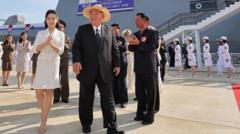The suspension follows the election of President Lee Jae-myung, who is focused on fostering dialogue with the North, amidst concerns from human rights activists and mixed reactions from border residents.
South Korea Halts Border Propaganda Broadcasts to North Korea

South Korea Halts Border Propaganda Broadcasts to North Korea
In a bid to mend inter-Korean relations, South Korea has ceased its propaganda loudspeaker broadcasts targeting North Korea.
South Korea's military announced that it has halted loudspeaker propaganda broadcasts directed at North Korea, an initiative seen as an attempt to "restore trust" between the two nations. This decision follows the recent election of President Lee Jae-myung, who had campaigned for improved relations with Pyongyang. The North has historically viewed the broadcasts as an act of aggression, previously threatening to destroy the speakers.
The propaganda broadcasts, which had been suspended for six years prior, resumed last June in response to North Korea's strategy of releasing balloons filled with waste across the border. These broadcasts typically included news and information about life in South Korea, democracy, and social issues.
Relations between the two Koreas had soured under former president Yoon Suk Yeol, who adopted a tougher stance against the North. Yoon was impeached following a controversial martial law declaration over threats he perceived from anti-state factions and North Korea sympathizers. President Lee aims to rekindle dialogue with the North and reduce ongoing tensions, claiming that the recent military decision is intended to pave the way for peace on the Korean Peninsula.
However, some human rights organizations have criticized the broadcasts' suspension, arguing that the loudspeakers served as an essential link to North Koreans, reinforcing their awareness that they are not isolated. Hana Song, director of the Database Center for North Korean Human Rights, expressed concern that this move could signify a return to appeasement tactics towards Kim Jong Un's regime.
Conversely, residents living near the border have expressed relief, citing the continuous noise from both South and North Korea's loudspeakers as a significant disturbance to their daily lives. Residents from Ganghwa county stated, "We hope this decision will lead to an end to North Korea's noise-based psychological warfare."
According to South Korea's Yonhap news agency, the military's move also reflects that North Korea has ceased sending garbage-filled balloons into South Korea, a development that precipitated the return of the propaganda broadcasts. Furthermore, the military has indicated that the loudspeakers can be reactivated should conditions necessitate such action.
Notably, this suspension comes shortly after the broadcasts had resumed last year when both nations engaged in reciprocal campaigns involving balloons and propaganda. Since the Korean War ended in 1953 without a formal peace treaty, both countries remain technically at war, making inter-Korean relations fraught with historical complexities.
The propaganda broadcasts, which had been suspended for six years prior, resumed last June in response to North Korea's strategy of releasing balloons filled with waste across the border. These broadcasts typically included news and information about life in South Korea, democracy, and social issues.
Relations between the two Koreas had soured under former president Yoon Suk Yeol, who adopted a tougher stance against the North. Yoon was impeached following a controversial martial law declaration over threats he perceived from anti-state factions and North Korea sympathizers. President Lee aims to rekindle dialogue with the North and reduce ongoing tensions, claiming that the recent military decision is intended to pave the way for peace on the Korean Peninsula.
However, some human rights organizations have criticized the broadcasts' suspension, arguing that the loudspeakers served as an essential link to North Koreans, reinforcing their awareness that they are not isolated. Hana Song, director of the Database Center for North Korean Human Rights, expressed concern that this move could signify a return to appeasement tactics towards Kim Jong Un's regime.
Conversely, residents living near the border have expressed relief, citing the continuous noise from both South and North Korea's loudspeakers as a significant disturbance to their daily lives. Residents from Ganghwa county stated, "We hope this decision will lead to an end to North Korea's noise-based psychological warfare."
According to South Korea's Yonhap news agency, the military's move also reflects that North Korea has ceased sending garbage-filled balloons into South Korea, a development that precipitated the return of the propaganda broadcasts. Furthermore, the military has indicated that the loudspeakers can be reactivated should conditions necessitate such action.
Notably, this suspension comes shortly after the broadcasts had resumed last year when both nations engaged in reciprocal campaigns involving balloons and propaganda. Since the Korean War ended in 1953 without a formal peace treaty, both countries remain technically at war, making inter-Korean relations fraught with historical complexities.



















